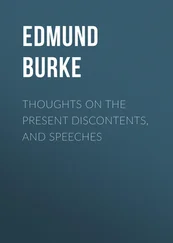Edmund Burke - Selections from the Speeches and Writings of Edmund Burke
Здесь есть возможность читать онлайн «Edmund Burke - Selections from the Speeches and Writings of Edmund Burke» — ознакомительный отрывок электронной книги совершенно бесплатно, а после прочтения отрывка купить полную версию. В некоторых случаях можно слушать аудио, скачать через торрент в формате fb2 и присутствует краткое содержание. Жанр: foreign_prose, История, Политика, literature_19, foreign_edu, foreign_antique, на английском языке. Описание произведения, (предисловие) а так же отзывы посетителей доступны на портале библиотеки ЛибКат.
- Название:Selections from the Speeches and Writings of Edmund Burke
- Автор:
- Жанр:
- Год:неизвестен
- ISBN:нет данных
- Рейтинг книги:4 / 5. Голосов: 1
-
Избранное:Добавить в избранное
- Отзывы:
-
Ваша оценка:
- 80
- 1
- 2
- 3
- 4
- 5
Selections from the Speeches and Writings of Edmund Burke: краткое содержание, описание и аннотация
Предлагаем к чтению аннотацию, описание, краткое содержание или предисловие (зависит от того, что написал сам автор книги «Selections from the Speeches and Writings of Edmund Burke»). Если вы не нашли необходимую информацию о книге — напишите в комментариях, мы постараемся отыскать её.
Selections from the Speeches and Writings of Edmund Burke — читать онлайн ознакомительный отрывок
Ниже представлен текст книги, разбитый по страницам. Система сохранения места последней прочитанной страницы, позволяет с удобством читать онлайн бесплатно книгу «Selections from the Speeches and Writings of Edmund Burke», без необходимости каждый раз заново искать на чём Вы остановились. Поставьте закладку, и сможете в любой момент перейти на страницу, на которой закончили чтение.
Интервал:
Закладка:
SELF-INSPECTION
Whatever turns the soul inward on itself, tends to concentre its forces, and to fit it for greater and stronger flights of science. By looking into physical causes our minds are opened and enlarged; and in this pursuit, whether we take or whether we lose our game, the chase is certainly of service.
POWER OF THE OBSCURE
Poetry, with all its obscurity, has a more general, as well as a more powerful, dominion over the passions, than the other art. And I think there are reasons in nature, why the obscure idea, when properly conveyed, should be more affecting than the clear. It is our ignorance of things that causes all our admiration, and chiefly excites our passions. Knowledge and acquaintance make the most striking causes affect but little. It is thus with the vulgar; and all men are as the vulgar in what they do not understand. The ideas of eternity and infinity, are among the most affecting we have: and yet perhaps there is nothing of which we really understand so little, as of infinity and eternity.
FEMALE BEAUTY
The object therefore of this mixed passion, which we call love, is the BEAUTY of the SEX. Men are carried to the sex in general, as it is the sex, and by the common law of nature; but they are attached to particulars by personal BEAUTY. I call beauty a social quality; for where women and men, and not only they, but when other animals give us a sense of joy and pleasure in beholding them (and there are many that do so), they inspire us with sentiments of tenderness and affection towards their persons; we like to have them near us, and we enter willingly into a kind of relation with them, unless we should have strong reasons to the contrary.
NOVELTY AND CURIOSITY
Curiosity is the most superficial of all the affections; it changes its object perpetually, it has an appetite which is very sharp, but very easily satisfied; and it has always an appearance of giddiness, restlessness, and anxiety. Curiosity, from its nature, is a very active principle; it quickly runs over the greatest part of its objects, and soon exhausts the variety which is commonly to be met with in nature; the same things make frequent returns, and they return with less and less of any agreeable effect. In short, the occurrences of life, by the time we come to know it a little, would be incapable of affecting the mind with any other sensations than those of loathing and weariness, if many things were not adapted to affect the mind by means of other powers besides novelty in them, and of other passions besides curiosity in ourselves.
PLEASURES OF ANALOGY
The mind of man has naturally a far greater alacrity and satisfaction in tracing resemblances than in searching for differences: because by making resemblances we produce NEW IMAGES; we unite, we create, we enlarge our stock; but in making distinctions we offer no food at all to the imagination; the task itself is more severe and irksome, and what pleasure we derive from it is something of a negative and indirect nature.
AMBITION
God has planted in man a sense of ambition, and a satisfaction arising from the contemplation of his excelling his fellows in something deemed valuable amongst them. It is this passion that drives men to all the ways we see in use of signalizing themselves, and that tends to make whatever excites in a man the idea of this distinction so very pleasant. It has been so strong as to make very miserable men take comfort, that they were supreme in misery; and certain it is, that, where we cannot distinguish ourselves by something excellent, we begin to take a complacency in some singular infirmities, follies, or defects of one kind or other. It is on this principle that flattery is so prevalent; for flattery is no more than what raises in a man's mind an idea of a preference which he has not.
EXTENSIONS OF SYMPATHY
For sympathy must be considered as a sort of substitution, by which we are put into the place of another man, and affected in many respects as he is affected; so that this passion may either partake of the nature of those which regard self-preservation, and turning upon pain may be a source of the sublime; or it may turn upon ideas of pleasure; and then whatever has been said of the social affections, whether they regard society in general, or only some particular modes of it, may be applicable here. It is by this principle chiefly that poetry, painting, and other affecting arts, transfuse their passions from one breast to another, and are often capable of grafting a delight on wretchedness, misery, and death itself.
PHILOSOPHY OF TASTE
So far, then, as taste belongs to the imagination, its principle is the same in all men; there is no different in the manner of their being affected, nor in the causes of the affection; but in the DEGREE there is a difference, which arises from two causes principally; either from a greater degree of natural sensibility, or from a closer and longer attention to the object.
CLEARNESS AND STRENGTH IN STYLE
We do not sufficiently distinguish, in our observations upon language, between a clear expression and a strong expression. These are frequently confounded with each other, though they are in reality extremely different. The former regards the understanding; the latter belongs to the passions. The one describes a thing as it is; the latter describes it as it is felt. Now, as there is a moving tone of voice, an impassioned countenance, an agitated gesture, which affect independently of the things about which they are exerted, so there are words, and certain dispositions of words, which being peculiarly devoted to passionate subjects, and always used by those who are under the influence of any passion, touch and move us more than those which far more clearly and distinctly express the subject-matter. We yield to sympathy what we refuse to description. The truth is, all verbal description, merely as naked description, though never so exact, conveys so poor and insufficient an idea of the thing described, that it could scarcely have the smallest effect, if the speaker did not call in to his aid those modes of speech that mark a strong and lively feeling in himself. Then, by the contagion of our passions, we catch a fire already kindled in another, which probably might never have been struck out by the object described. Words, by strongly conveying the passions, by those means which we have already mentioned, fully compensate for their weakness in other respects.
UNITY OF IMAGINATION
Since the imagination is only the representation of the senses, it can only be pleased or displeased with the images, from the same principle on which the sense is pleased or displeased with the realities; and consequently there must be just as close an agreement in the imaginations as in the senses of men. A little attention will convince us that this must of necessity be the case.
EFFECT OF WORDS
If words have all their possible extent of power, three effects arise in the mind of the hearer. The first is, the SOUND; the second, the PICTURE, or representation of the thing signified by the sound; the third is, the AFFECTION of the soul produced by one or by both of the foregoing. COMPOUNDED ABSTRACT words, of which we have been speaking (honour, justice, liberty, and the like), produce the first and the last of these effects, but not the second. SIMPLE ABSTRACTS, are used to signify some one simple idea without much adverting to others which may chance to attend it, as blue, green, hot, cold, and the like; these are capable of effecting all three of the purposes of words; as the AGGREGATE words, man, castle, horse, etc. are in a yet higher degree. But I am of opinion, that the most general effect, even of these words, does not arise from their forming pictures of the several things they would represent in the imagination; because, on a very diligent examination of my own mind, and getting others to consider theirs, I do not find that once in twenty times any such picture is formed, and, when it is, there is most commonly a particular effort of the imagination for that purpose. But the aggregate words operate, as I said of the compound-abstracts, not by presenting any image to the mind, but by having from use the same effect on being mentioned, that their original has when it is seen.
Читать дальшеИнтервал:
Закладка:
Похожие книги на «Selections from the Speeches and Writings of Edmund Burke»
Представляем Вашему вниманию похожие книги на «Selections from the Speeches and Writings of Edmund Burke» списком для выбора. Мы отобрали схожую по названию и смыслу литературу в надежде предоставить читателям больше вариантов отыскать новые, интересные, ещё непрочитанные произведения.
Обсуждение, отзывы о книге «Selections from the Speeches and Writings of Edmund Burke» и просто собственные мнения читателей. Оставьте ваши комментарии, напишите, что Вы думаете о произведении, его смысле или главных героях. Укажите что конкретно понравилось, а что нет, и почему Вы так считаете.












